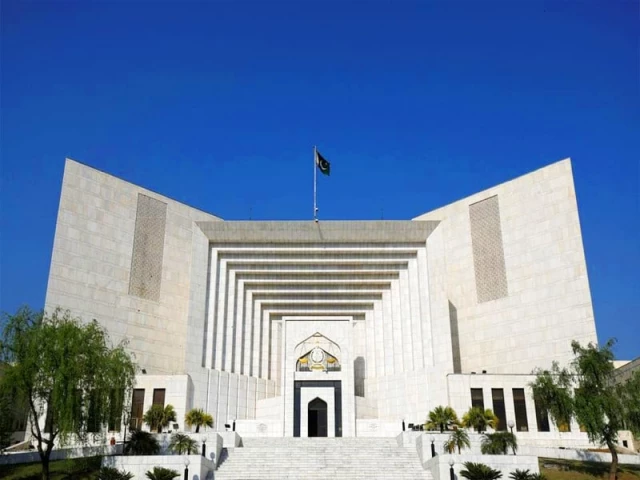Islamabad:
The Supreme Court has ruled that the Federal Income Board (FBR) must preserve the dignity of taxpayers while making tax recovery measures.
A nine -page judgment created by Judge Ayesha Malik, dismissing the request of FBR against an order of the Superior Court, indicated that a notice that seeks recovery on the same date as its issuance would defeat the objective of establishing a date and would leave the legal safeguard without meaning. “Another aspect that is important is the constitutional basis of section 140 of the Ordinance.”
The ruling observed that the notification requirement before recovery is not simply legal, but reflects the broader guarantees of due process and the judgment just under article 10 of the Constitution, as well as the right to dignity under article 14.
The courts have constantly confirmed that even in tax matters, recovery must be carried out in a way that respects the dignity and legal safeguards of the individual. Consequently, even when the law allows coercive recovery, it must be carried out in a way that preserves the dignity of the taxpayer.
The sentence was issued by a bank from three judges of the Apex Court, led by Judge Munib Akhtar, who examined two central questions: if an FBR commissioner may demand immediate payment on the same day that a notice is issued under section 140 of the Income Tax Ordinance, or if the Ordinance requires a future compliance date.
FBR’s position was that the immediate recovery is allowed under section 140, without obligation to issue a subsequent notice or provide a specific payment date.
However, the sentence argued that section 140 does not allow immediate coercive recovery in the absence of an expiration date. When interpreted in context, the provision requires that any party that has money on behalf of the taxpayer is issued a notice that clearly specifies a deadline to download the responsibility.
In his additional note, Judge Shahid Waheed said that a substantial question before the bank was the intersection of the tax law and the rights of taxpayers.
“In a legal framework that defends fundamental rights, such as the right to a fair trial, access to justice, the right to dignity and due process,” he said.
He raised a critical question: if there is any justifiable reason to maintain an authorized domain culture in tax collection?
“This investigation defies the existing norms that often prioritize the recovery of taxes over the rights and protections guaranteed to taxpayers, which potentially undermines the very essence of justice. It also invites an exhaustive examination of the delicate balance that must be maintained between the efficient recovery of fiscal debts, as ordered by law, and the imperative to protect the rights of those that are being imposed.”
Judge Waheed further reflected on the spirit of sections 137, 138 and 140, comparing the ideal recovery process with that of a bees: “By deepening the provisions of sections 137, 138 and 140, it becomes evident that the law prescribes a recovery process that, like a honey bee, collects nectars of the flowers without causing pain to the plant that the officers of the law and the recovery of the law and the recovery Recovery of a man of a honey bee, (one) (one is the plant of the plant plant, the officers who carry out the collection of taxes and the recovery of a form of recovery of a form of treatment: (one) that approaches a treatment) that it is a treatment of the plant that the officers of the plant of the plant, the officers of the plant, the realization of the plant, the realization of the plant, the plant. Plant officers are so that the treatment of the plant.
When describing the procedural trip, he said: “How is it?
Subsequently, the second phase covers the evaluation process, detailing the exact sum that the taxpayer is legally obliged to pay. “Finally, if the taxpayer does not meet this obligation voluntarily, the third phase introduces the recovery methods that will be used.”
Underlining the primacy of dignity, he emphasized: “The right to dignity is the most central of all fundamental rights, since it is the source from which all other rights are derived. The ordinance aims to achieve a balance between guaranteeing tax recovery and maintaining the dignity of taxpayers. The recovery process executed in these cases discouraged this balance.”
Judge Waheed also observed: “The lack of verification of whether the ‘amount payable’ had been classified as ‘tax owed’ before declaring the taxpayer (defendant) as a resident, and subsequently issuing a direct payment notice to the person who has money in the name of the taxpayer (defendant), promoted to discredit the taxpayer (defendant) within his community and negative that affects his reputation for business”.
He warned against oppressive collection practices. “No legal standard can justify the authorized domain culture in tax recovery, since it fundamentally undermines the basic principles of justice. This creates an imbalance between the need for efficient tax recovery and the protection of taxpayers’ rights.”




